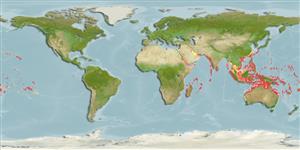>
Holocentriformes (Squirrelfishes, soldierfishes) >
Holocentridae (Squirrelfishes, soldierfishes) > Holocentrinae
Etymology: Sargocentron: Greek, sargos = sargus + Greek, kentron = sting (Ref. 45335).
More on author: Lacepède.
Environment: milieu / climate zone / depth range / distribution range
экология
морской ассоциированный с рифами; пределы глубины 1 - 60 m (Ref. 27370), usually 2 - 30 m (Ref. 30573). Tropical; 30°N - 33°S, 27°E - 128°W
Indo-Pacific: Red Sea and East Africa to the Hawaiian and Pitcairn islands, north to the Ryukyu and Ogasawara islands, south to northern Australia and Lord Howe Island. Throughout Micronesia (Ref. 1602).
Size / Вес / Возраст
Maturity: Lm ? range ? - ? cm
Max length : 17.0 cm TL самец/пол неопределен; (Ref. 30874)
колючие лучи спинного плавника (общее число) : 11; членистые (мягкие) лучи спинного плавника (общее число) : 12 - 14; колючие лучи анального плавника: 4; членистые (мягкие) лучи анального плавника: 8 - 9. Body with alternating broad red and narrower silvery white stripes (Ref. 4201); red head with 2 vertical white streaks on the opercle, one on its edge and an oblique one below the eye; distinctive reddish-black to black dorsal fin with two white streaks. Five or 6 oblique rows of scales on cheek. Maxilla nearly reaching or extending slightly beyond a vertical at anterior edge of the pupil; upper jaw length 2.75-2.95 in head length. Body depth 2.75-3.25 in SL; head length 2.7-3.15 in SL; snout length 4.0-4.4 in head length; interorbital width 4.4-4.9 in head length; premaxillary groove extending slightly posterior to a vertical at anterior edge of orbit; anterior end of nasal bone rounded; medial margin of nasal bone without spinule; nasal fossa without spinules on its edge; upper edge of suborbital bones below anterior half of eye spineless; small preopercular spine, its length 2-3 times in orbit diameter, 2.85-3.5 in head length; longest 4th dorsal spines, 1.7-2.25 in head length; third anal spine 1.2-1.35 in head length (Ref. 27370).
A common species that inhabits shallow coral reefs (Ref. 58534) and lagoon and seaward reefs to depths of 30 m or more. Benthopelagic (Ref. 58302). Occurs under ledges or in crevices during the day and feeds on isopods; at night it roams over open sand and low-profile reef areas to feed on polychaetes and small crabs. Stomach contents listed gastropods (e.g. Atys sp.), polychaetes, small clams, solenogastrid, isopods, brachyuran crabs, and other crustaceans (Ref. 27370). Tends to occur in aggregations (Ref. 30573). Venomous spine on its preopercle. Size rarely exceeds 13 cm. Minimum depth reported taken from Ref. 30874.
Life cycle and mating behavior
половая зрелость | размножение | нерест | икра | Fecundity | личинки
Randall, J.E., 1998. Revision of the Indo-Pacific squirrelfishes (Beryciformes: Holocentridae: Holocentrinae) of the genus Sargocentron, with descriptions of four new species. Indo-Pac. Fish. (27):105 p. (Ref. 27370)
Статус Красного Списка МСОП (Ref. 130435: Version 2024-2)
Использование человеком
рыболовство: не имеет хозяйственного значения; аквариум: коммерческий
дополнительная информация
инструменты
Специальные отчеты
Скачать в формате XML
ресурсы в Интернет
Estimates based on models
Preferred temperature (Ref.
123201): 24.7 - 29, mean 27.7 °C (based on 1144 cells).
Phylogenetic diversity index (Ref.
82804): PD
50 = 0.5000 [Uniqueness, from 0.5 = low to 2.0 = high].
Bayesian length-weight: a=0.01660 (0.01085 - 0.02538), b=2.98 (2.86 - 3.10), in cm total length, based on LWR estimates for this species & Genus-body shape (Ref.
93245).
Trophic level (Ref.
69278): 3.4 ±0.2 se; based on diet studies.
Generation time: 1.0 ( na - na) years. Estimated as median ln(3)/K based on 2
growth studies.
устойчивость к внешним воздействиям (Ref.
120179): высокий, минимальное время удвоения популяции до 15 месяцев (K=1.13).
Fishing Vulnerability (Ref.
59153): Low vulnerability (10 of 100).
Nutrients (Ref.
124155): Calcium = 84.8 [33.5, 355.9] mg/100g; Iron = 0.696 [0.281, 2.192] mg/100g; Protein = 18.5 [17.3, 19.7] %; Omega3 = 0.157 [0.066, 0.371] g/100g; Selenium = 42.2 [22.9, 82.5] μg/100g; VitaminA = 54.4 [19.7, 155.9] μg/100g; Zinc = 2.32 [0.96, 4.43] mg/100g (wet weight);
